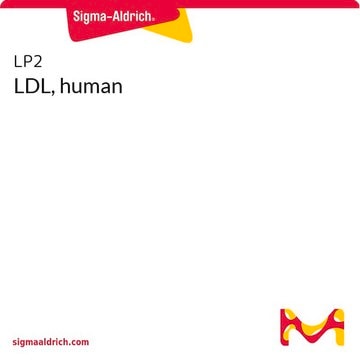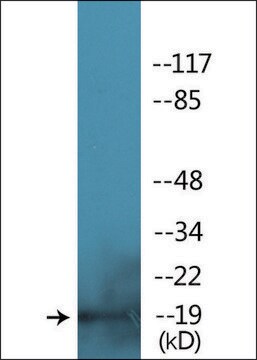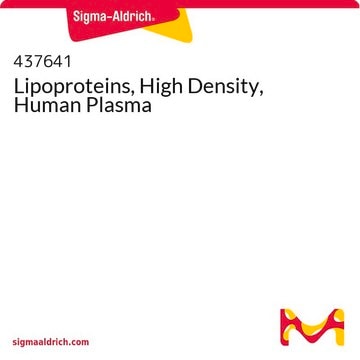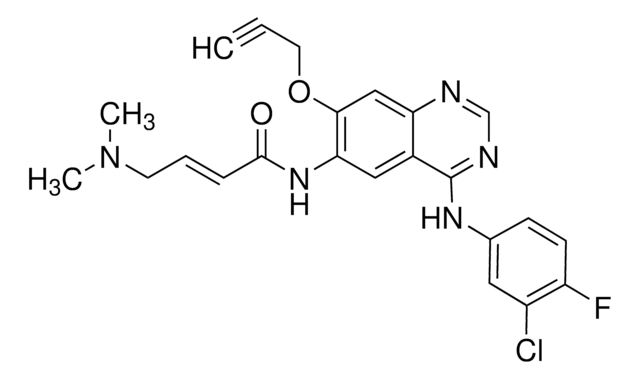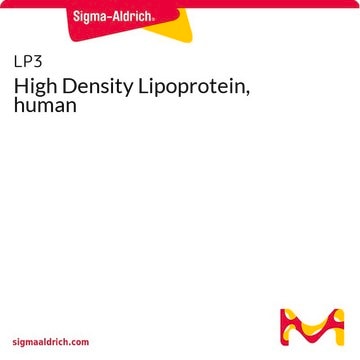推荐产品
生物源
human
重組細胞
expressed in HEK 293 cells
籤條
6-His tagged (C-terminus)
化驗
≥90% (SDS-PAGE)
形狀
lyophilized
分子量
calculated mol wt 86 kDa
observed mol wt 125-140 kDa
observed mol wt 95-110 kDa by SDS-PAGE (Ala22 or Asp193 is the predicted N-terminal.)
包裝
pkg of 10 and 50 μg
UniProt登錄號
運輸包裝
wet ice
儲存溫度
−20°C
基因資訊
human ... LDLR(3949)
一般說明
Low-Density Lipoprotein (LDL) Receptor, also known as LDLR, FH, FHC, LDLCQ2, and is a mosaic protein of ~840 amino acids (after removal of signal peptide) that mediates the endocytosis of cholesterol-rich LDL. It is a cell-surface receptor that recognizes the apoprotein B100 which is embedded in the phospholipid outer layer of LDL particles. The receptor also recognizes the apoE protein found in chylomicron remnants and VLDL remnants (IDL). It belongs to the Low density lipoprotein receptor gene family. LDL receptor complexes are present in clathrin-coated pits (or buds) on the cell surface, which when bound to LDL-cholesterol via adaptin, are pinched off to form clathrin-coated vesicles inside the cell. This allows LDL-cholesterol to be bound and internalized in a process known as endocytosis and prevents the LDL just diffusing around the membrane surface. This occurs in all nucleated cells (not erythrocytes), but mainly in the liver which removes ~70% of LDL from the circulation. Synthesis of receptors in the cell is regulated by the level of free intracellular cholesterol; if it is in excess for the needs of the cell then the transcription of the receptor gene will be inhibited. LDL receptors are translated by ribosomes on the endoplasmic reticulum and are modified by the Golgi apparatus before travelling in vesicles to the cell surface. LDL is directly involved in the development of atherosclerosis, due to accumulation of LDL-cholesterol in the blood. Atherosclerosis is the process responsible for the majority of cardiovascular diseases.
外觀
Lyophilized from 0.22 μm filtered solution in PBS, pH 7.4. Normally Mannitol or Trehalose is added as protectants before lyophilization.
重構
Centrifuge the vial prior to opening. Reconstitute in sterile PBS, pH 7.4 to a concentration of 50 μg/mL. Do not vortex. This solution can be stored at 2-8°C for up to 1 month. For extended storage, it is recommended to store at -20°C.
儲存類別代碼
11 - Combustible Solids
水污染物質分類(WGK)
WGK 3
閃點(°F)
Not applicable
閃點(°C)
Not applicable
Sergio Fazio et al.
The Journal of clinical endocrinology and metabolism, 102(9), 3340-3348 (2017-06-22)
Angiopoietin-like 3 (ANGPTL3) deficiency in plasma due to loss-of-function gene mutations results in familial combined hypobetalipoproteinemia type 2 (FHBL2) in homozygotes. However, the lipid phenotype in heterozygotes is much milder and does not appear to relate directly to ANGPTL3 levels.
Dalia A Bashir et al.
Clinical and applied thrombosis/hemostasis : official journal of the International Academy of Clinical and Applied Thrombosis/Hemostasis, 27, 1076029621992128-1076029621992128 (2021-02-05)
Hyperferritinemia is associated with poor outcomes in critically ill patients with sepsis, hemophagocytic lymphohistiocytosis (HLH), macrophage activation syndromes (MAS) and coronavirus disease 19 (COVID-19). Autopsies of hyperferritinemic patients that succumbed to either sepsis, HLH, MAS or COVID-19 have revealed disseminated
Altar M Munis et al.
Journal of virology, 92(23) (2018-09-21)
Vesicular stomatitis virus Indiana strain G protein (VSVind.G) is the most commonly used envelope glycoprotein to pseudotype lentiviral vectors (LV) for experimental and clinical applications. Recently, G proteins derived from other vesiculoviruses (VesG), for example, Cocal virus, have been proposed
Yingxue Cui et al.
Acupuncture in medicine : journal of the British Medical Acupuncture Society, 37(4), 237-243 (2019-05-30)
To investigate the anti-atherogenic effect of moxibustion and whether it is mediated through the reverse cholesterol transport process. 8-week-old male apolipoprotein E deficient (ApoE-/- knockout) mice were randomly divided into two groups (n=10 per group): atherosclerosis (AS) and AS plus
我们的科学家团队拥有各种研究领域经验,包括生命科学、材料科学、化学合成、色谱、分析及许多其他领域.
联系技术服务部门
